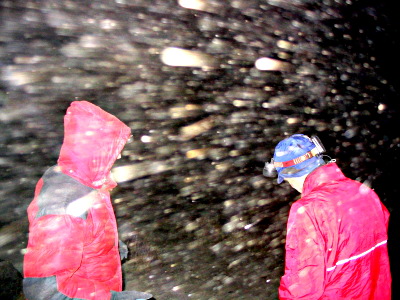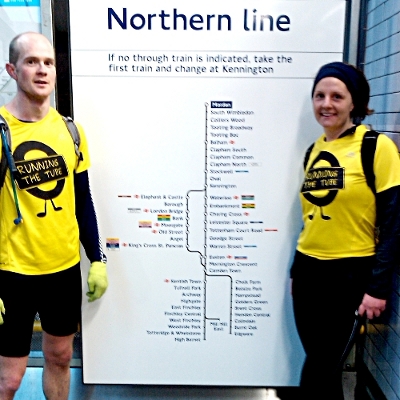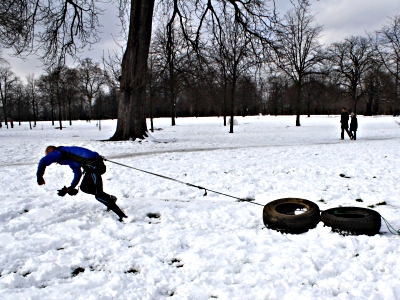Expeditions in the twenty first century are rarely necessary.
In fact, the vast majority of those conducted last century weren’t born of an actual need to accomplish anything either. Not like the old days where crossing a mountain range or sea might have been the only way to survive.
In that sense, it seems fair to say that most expeditions are contrived. A set of circumstances are created to produce an environment that’s somehow challenging in which to exist or make progress. You don’t need to swim the Channel when there’s a perfectly good boat. You chose to be there and under those circumstances.
So, why, if all of these situations are artificially created, do people make things hard for themselves? Why swim the Channel without a wetsuit and why bother climbing Everest without a guide when there are plenty who will take you?
Why do things the hard way? What difference does it make, purpose it serve and good it do?
As someone who enjoys creating arbitrary challenges for himself I thought I would give this idea some thought. I think to approach comprehensiveness this unfortunately requires a little more than the usual three paragraph blog posts we’re all used to. However, I’ve broken it down with sub-headings and a list to make it a little easier to digest. Chew slowly.

Ways we make things hard
To give some structure to my analysis, I am going to build the case around a few umbrella examples of ways in which people make things harder:
- Creating rules (e.g. going “unsupported”, swimming without a wetsuit or not checking into a hotel when you get tired)
- Doing it from scratch (rather than using a guide, joining an event or going through a company)
- Going your own way (e.g. climbing a new mountain rather than following someone else’s route)
I’ll take each of these examples and explain how I think they can be beneficial to the participant. No doubt there are other examples and no doubt many of the explanations I give will overlap between each example. But it is a start.
1. Creating rules
Or: Why isn’t Dan Martin using a wetsuit for his swim?*
It would be easier to swim the Atlantic in a wetsuit and it would be easier to reach the North Pole if you arranged for someone to drop off supplies for you halfway. A facile argument might say that, in both instances, a flight would be easier still but wouldn’t provide any challenge. Conversely, setting off naked without food or maps would be far harder and too much of a challenge.
A challenge needs to be at the right level for the participant and for some (most), swimming the Atlantic would be plenty hard enough even in a wetsuit, just as getting to the North Pole would be tough even with regular food caches. But it isn’t for everyone. Some will need a greater challenge and introducing rules and constraints can provide that.
And why is challenge important?
Because, I believe, the greater the effort required for an achievement, the greater the potential for reward. If it’s easy for you to walk up Snowdon then it probably won’t be a lasting achievement. But if you have never walked up a mountain before and have to spend significant time and energy to get yourself to the top then the impact might be far greater.
But I’d also argue further – and I may lose some of you here – that the very same mountaintop view, mouthful of food or chime of birdsong can be sweeter if greater effort has been required to obtain it. Driving to a designated viewpoint and stepping out of the car to witness it will, in my opinion, not elicit the same response as if you had slogged up that hill on a laden bicycle. The tin of fish and cold pasta consumed in a tent at midnight will not taste the same to the person who was dropped off at the campsite as it does to those who hiked 10 hours through rain that day.
The greater the effort required relative to the person, the great the potential for reward, and creating rules is a good way of controlling a challenge so that it provides just the right amount.
(*I’m aware that there are many reasons for not using a wetsuit besides the idea that it makes it easier e.g. chafe, restriction of movement, the feel. I’m just using it here for illustrative purposes)

2. Doing it from scratch
Or: What’s the difference between climbing Everest yourself and with a guide?
There are two reasons why a trip largely organised off your own back, in my opinion, can be more beneficial: First, there will likely be more experiences along the way by nature of having to do everything yourself. Second, I believe there is an unique sense of ownership it can bring.
Expeditions are about more than what actually happens in the field. The research, planning, sponsor pitches, training and incessantly telling people about what you’re doing are all part of it. With each of these steps is potential for experience and thus for learning.
In joining an organised trip, you can lose out on many of these things. Tour company sorting your visa for you? You’ll miss out on the bewildering infuriation of embassy bureaucracy. Kit list provided? Not the same as researching your options and selecting them through experience. Often, even with a guide or through an event, you’ll still have many of these experiences (and, no doubt, some unique ones too) but take a hundred people who have been guided up Everest and a hundred who have climbed it under their own leadership, and I bet the latter group will have been through more.
But, in addition to this quantitative difference (the more you do yourself, the more you’re likely to experience), I’d also argue that there is a less tangible but just as important sense of ownership that is also proportional to how much of an expedition you are organising yourself. As with any project, the more ownership you feel, the more rewarding its fruition and success will be to you. You can still gain similar feelings in joining an organised trip and to assert otherwise would be patronising, but I believe that there is a unique element to the feeling of ownership held by those who have done it all themselves.

3. Going your own way
Or: Who cares who climbed the mountain first?
Imagine you paint an exact replica of the Mona Lisa using an elaborate system of Paint-By-Numbers. A great achievement, no doubt, but surely not the same as Mr Da Vinci’s initial effort. So it is, I would argue, with copying someone else’s “work” on an expedition. Not bad (as long as you’re honest about it) and not necessarily lesser. Just different.
Follow a path or guidebook up a well-trodden mountain route and your feet may fall in much the same place as the mountain’s first pioneers, you may see the same views and feel those same elements against you, but I would argue that your experience still differs significantly. You cannot recreate the nerves or excitement generated from entering what is unknown to the world, where every step you take is based on your own judgement, and no prior information is available to inform your decisions or ease your mind. It doesn’t have to be the first ascent of a major Himalayan peak, just an adventure that is of your own choosing and led under your own guidance.
That is not to imply, however, that someone repeating a route won’t be nervous or have to rely on their own judgment, just that their experience of doing so will be different and can never be the same as the first person’s.
Undoubtedly nowadays, claims of “firsts” are routinely based on elaborate criteria (such as a conjunction of age, gender, nationality and specific route choice) and used for promotion. Discussion of that issue is tangential to this article but suffice it to say that the more qualifications for a “first”, the less the above points apply. But for every elaborate claim of a “first” in the name of publicity, there are probably just as many who do it for the simple reason that through repeating a challenge – breaking a record rather than setting it, cycling a popular touring route rather than making one up – many elements initially present in the challenge have been removed or changed.
Conclusion – Why do things the hard way?
I have argued that, firstly, the greater effort required for completion of a challenge, the greater the potential rewards for the participant. Secondly, the more you organise a venture yourself from scratch, the more opportunities for gaining experience you gain and the better chance of holding that unique sense of ownership. Thirdly, in going your own way and trying something novel, you get a unique set of experiences that no one else following in your footsteps will ever quite replicate.
(This post was originally written for Dan Martin as part of the Adventurer’s Blogging Chain)
What do you think? Please do add your thoughts below…